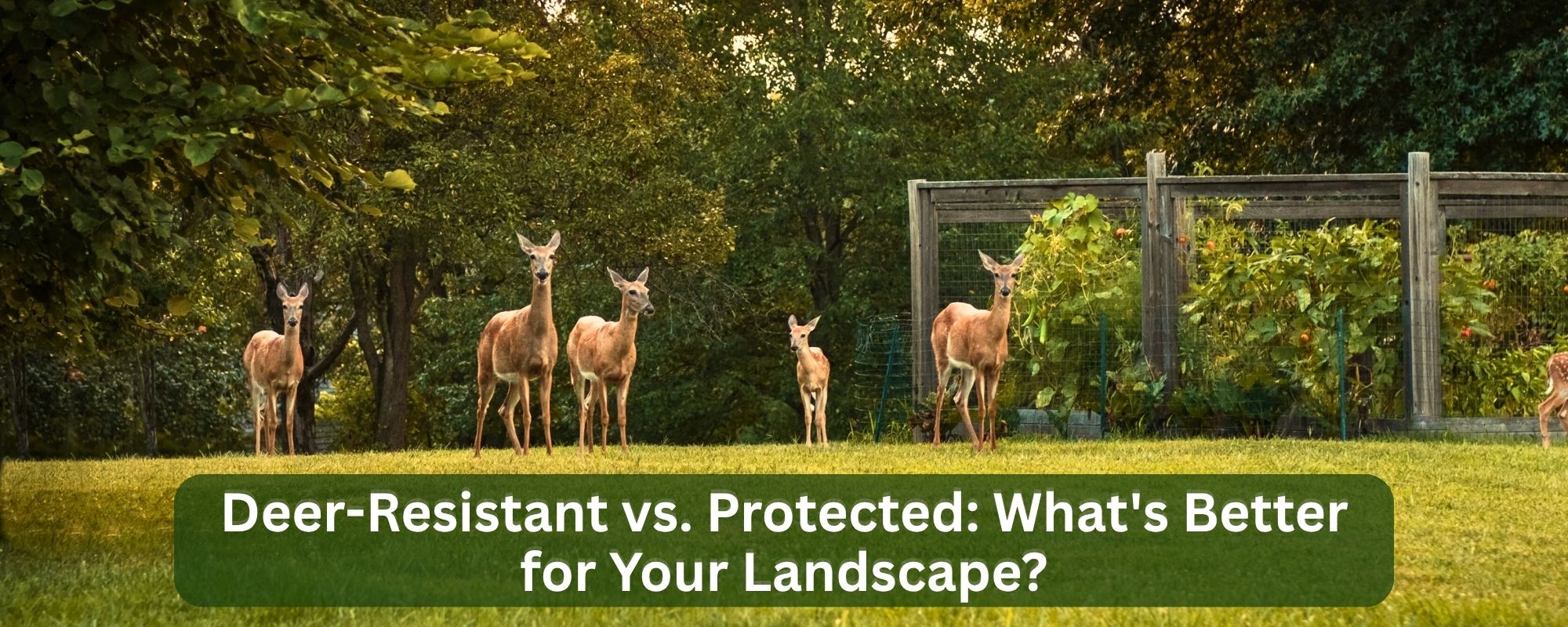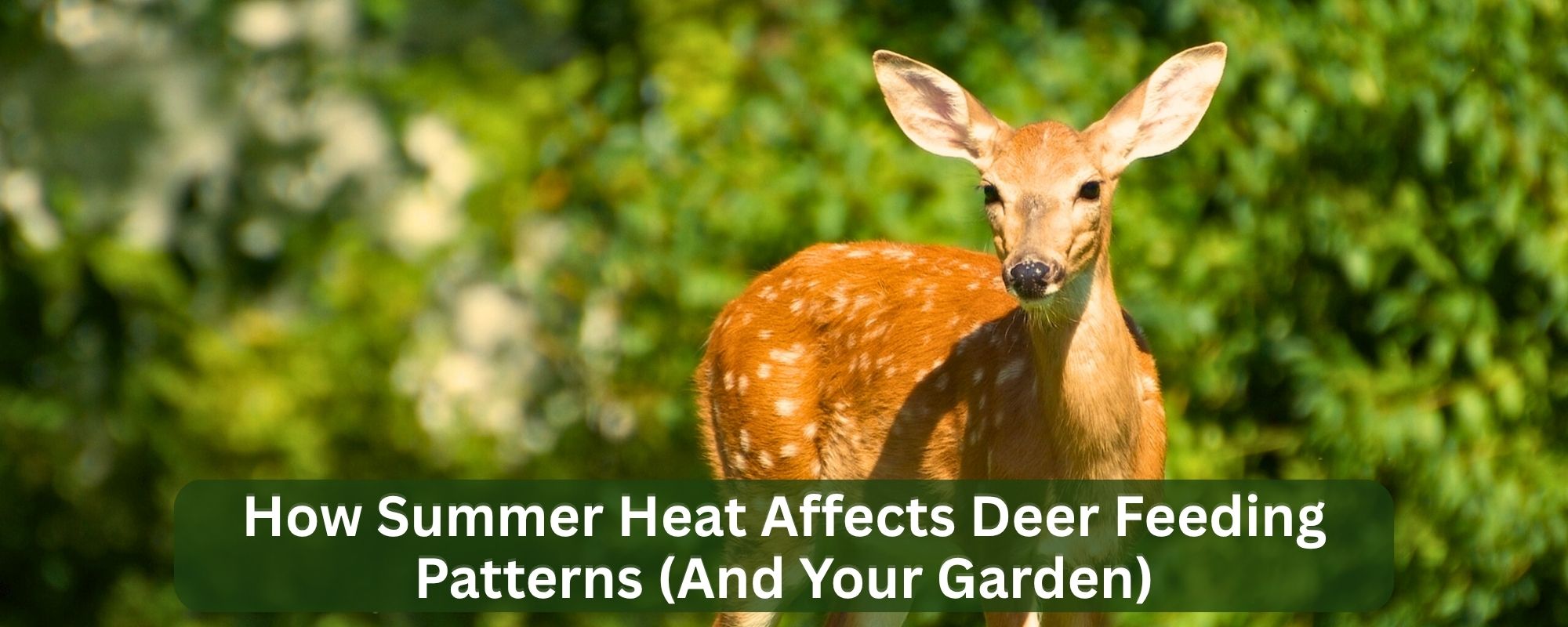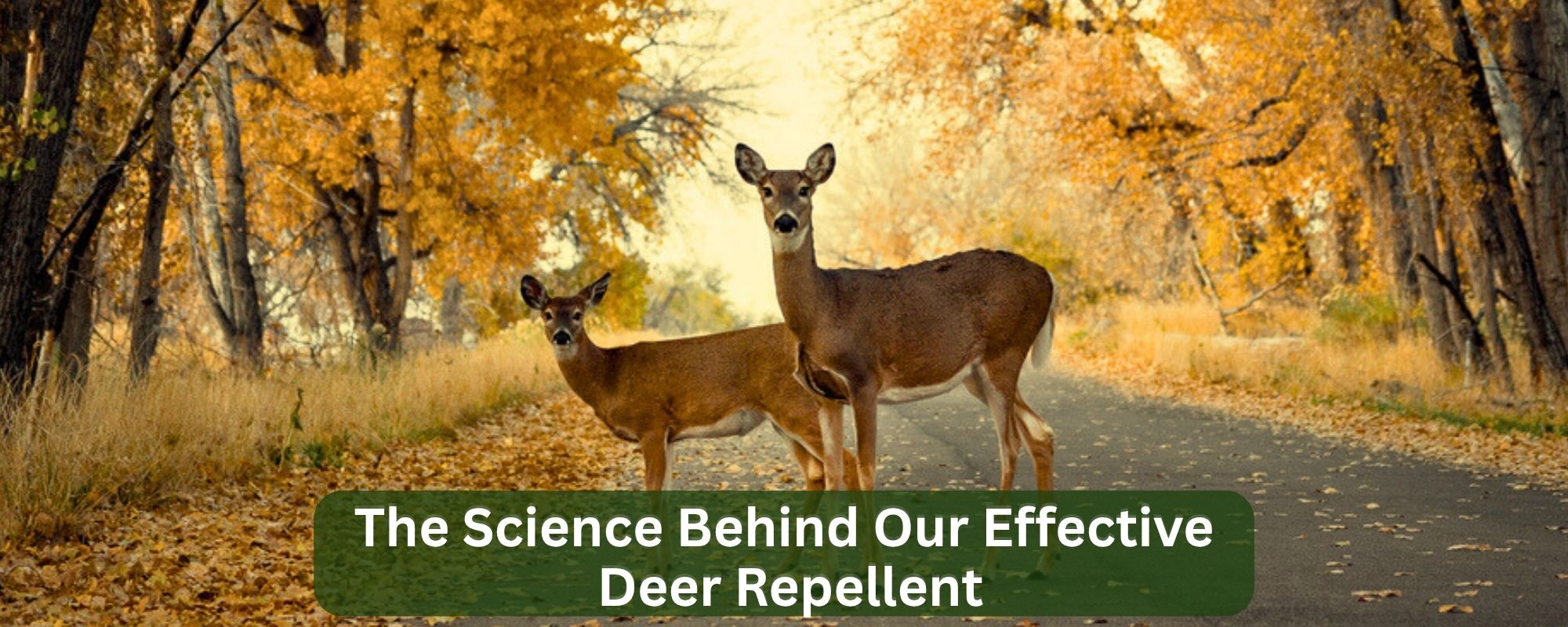Deer-Resistant vs. Protected: What's Better for Your Landscape?

Deer are beautiful creatures, but they can cause significant damage to your landscape when they feed on your plants, trees, and shrubs. Whether you’re designing a new garden or maintaining an existing one, one of the most common challenges is deciding how to protect your landscape from these hungry grazers. Deer-resistant plants and deer protection methods, such as deer repellent sprays, are two popular approaches to dealing with this issue. But which one is better for your landscape?
In this blog, we’ll explore the differences between deer-resistant plants and deer protection methods, compare their benefits and limitations, and help you determine which approach, or combination of approaches, works best for your garden.
What Are Deer-Resistant Plants?
Deer-resistant plants are species that deer naturally avoid due to their strong scents, bitter tastes, or tough textures. These plants have evolved with characteristics that make them less appealing to deer. While no plant is entirely deer-proof, deer-resistant plants are less likely to be grazed on or damaged by deer.
Examples of Deer-Resistant Plants:
- Lavender: The strong scent of lavender is a natural deterrent to deer.
- Marigolds: The pungent smell of marigolds keeps deer away.
- Thorny bushes: Holly, barberry, and rose bushes with thorns are unappealing to deer.
- Herbs: Sage, rosemary, and thyme are often avoided by deer due to their strong fragrances.
By incorporating these plants into your landscape, you can create deer-resistant zones where deer are less likely to wander or feed.
What Is Deer Protection (Deer Repellent Spraying)?
Deer protection involves actively deterring deer from entering your property or feeding on your plants through repellents, barriers, or motion-activated devices. Deer repellent sprays are one of the most effective ways to protect your plants, trees, and shrubs from deer. These sprays create an unpleasant scent or taste that deer find irritating, causing them to avoid the area.
Types of Deer Protection:
- Deer repellent sprays: Our weather-resistant deer repellent formula uses natural ingredients like garlic and peppermint oil to create an effective, safe barrier for your plants.
- Motion-activated sprinklers: These sprinklers release a burst of water when they detect motion, startling deer and causing them to leave.
- Physical barriers: Fences or tree guards can be installed to physically block deer from reaching your plants.
Deer protection methods are often more direct and immediate, offering targeted solutions for specific problem areas.
Deer-Resistant Plants: Pros and Cons
Pros of Deer-Resistant Plants:
- Low maintenance: Once established, deer-resistant plants require less ongoing attention. They naturally deter deer and don’t need to be re-applied like sprays.
- Eco-friendly: Deer-resistant plants are a natural way to deter deer without chemicals or sprays, making them an excellent option for environmentally conscious gardeners.
- Long-term solution: Deer-resistant plants, once established, provide long-term protection without ongoing effort.
Cons of Deer-Resistant Plants:
- Limited variety: While there are many deer-resistant plants to choose from, the selection is limited. Your design options may be restricted, and certain plants may not fit with your desired aesthetic.
- Not foolproof: No plant is entirely deer-proof. If deer are hungry enough or there is a shortage of food, they may still graze on deer-resistant plants.
- Slow to establish: Some deer-resistant plants take time to establish themselves and grow to a size where they are effective at deterring deer.
Deer Protection: Pros and Cons
Pros of Deer Protection (Repellent Spraying):
- Targeted protection: Deer repellent sprays can be applied directly to the plants that are most vulnerable, offering protection to high-risk areas of your landscape.
- Wide range of plants: You’re not limited to just deer-resistant species. Repellent sprays work on a variety of plants, allowing you to grow the plants you love without worrying about deer damage.
- Customizable: You can apply deer repellents as needed, adjusting the level of protection based on your property’s needs.
- Effective for specific problems: If you have a deer problem in one part of your yard (e.g., near fruit trees or flower beds), spraying can be focused in that area for targeted control.
Cons of Deer Protection (Repellent Spraying):
- Ongoing maintenance: Repellent sprays need to be reapplied regularly, especially after rain or watering, making them more labor-intensive than planting deer-resistant species.
- Chemical exposure: While natural repellents are safe for most plants and pets, they may not be for everyone. Some gardeners may prefer a more chemical-free solution.
- Temporary solution: The effectiveness of sprays is short-term, meaning you need to stay on top of reapplying to maintain consistent protection.
Combining Deer-Resistant Plants and Deer Protection
In many cases, the best strategy is a combination of both deer-resistant plants and deer protection methods. Here’s how you can use both approaches to create a deer-free landscape:
Why a Combination Works:
- Increased effectiveness: While deer-resistant plants can naturally deter deer, deer repellent sprays provide an additional layer of protection, especially for more vulnerable plants.
- Flexibility in design: You can select your favorite plants while using repellent sprays to protect those that aren’t naturally deer-resistant.
- Year-round protection: Deer sprays offer consistent protection throughout the year, while deer-resistant plants can thrive with little additional care.
This combination allows you to build a beautiful, deer-free garden without being restricted by the limitations of either method.
Why Choose Deer Guys for Deer Control?
At Deer Guys, we specialize in providing customized deer control services that fit your unique landscape needs. Here’s why our Deer Repellent Spraying Service is the best option for protecting your garden:
- Natural, eco-friendly ingredients: Our deer repellents are made with safe, non-toxic ingredients that won’t harm your plants, pets, or family.
- Long-lasting protection: Our weather-resistant formula stays effective even through rain, snow, or high winds, providing continuous protection.
- Customized plans: We tailor our deer control strategies to your specific landscape, ensuring your plants, trees, and shrubs are fully protected from deer damage.
- Expert service: Our team has years of experience in deer control, and we provide regular follow-up services every 3-4 weeks to ensure your property stays deer-free.
Related Services
- Deer Repellent Spraying Service – Learn more about how our professional spraying service can protect your landscape from deer damage.
- Our Products – Explore the safe, natural ingredients in our deer repellent.
- Weather-Resistant Formula – See how our formula withstands harsh weather conditions.
- Contact Us – Reach out today to schedule your first deer repellent application.
Final Thoughts: What’s Best for Your Landscape?
Deciding between deer-resistant plants and deer protection methods depends on your landscaping goals, personal preferences, and the level of protection you need. Deer-resistant plants are an excellent long-term, low-maintenance solution, but deer protection sprays offer immediate, customizable defense for all your plants.
By using both strategies, you can create a deer-free landscape that stays beautiful, healthy, and protected for years to come.
Contact us today to learn more about our Deer Repellent Spraying Service and how we can protect your landscape from deer damage!




